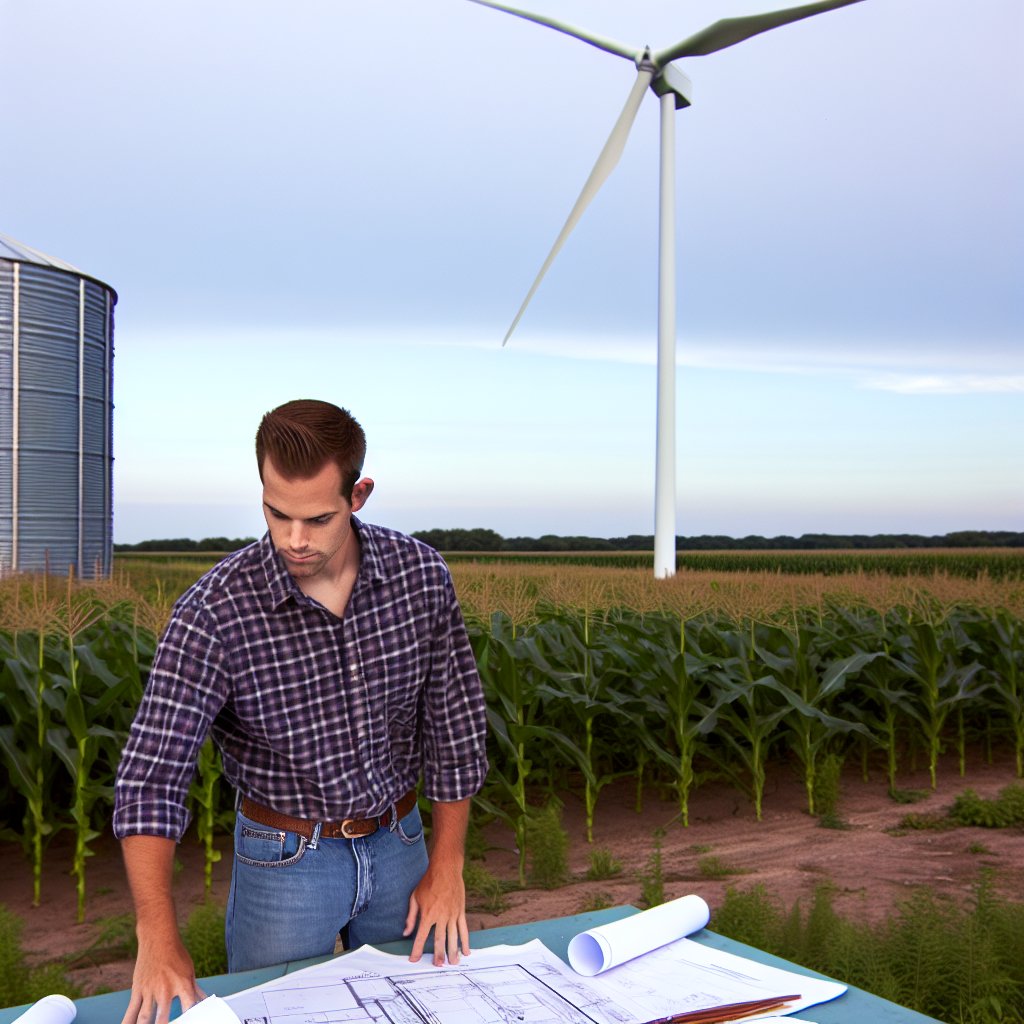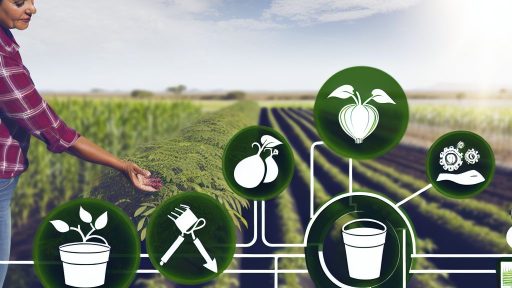Introduction to Renewable Energy Tax Credits for Farmers
Farmers today have a unique opportunity to invest in renewable energy.
Tax credits make these investments more financially viable.
Such incentives help reduce upfront costs and encourage sustainable practices.
By taking advantage of these credits, farmers can enhance their operations.
Additionally, they contribute positively to the environment.
Understanding these tax credits is crucial for maximizing benefits.
Various federal and state programs are designed to support farmers in this area.
These programs offer financial relief and promote renewable energy adoption.
Farmers should stay informed about the latest tax credit options available.
Ultimately, renewable energy can lead to lower energy bills.
It also adds resilience to farming operations in the long term.
The following sections will delve into specific tax credits available to farmers.
Overview of Federal Tax Credits Available
Farmers today can benefit from several federal tax credits.
These credits incentivize the adoption of renewable energy technologies.
They also improve energy efficiency on farms.
Transform Your Agribusiness
Unlock your farm's potential with expert advice tailored to your needs. Get actionable steps that drive real results.
Get StartedUnderstanding these credits helps farmers make informed financial decisions.
Investment Tax Credit
The Investment Tax Credit (ITC) is a significant benefit for solar energy systems.
Farmers can receive a tax credit for a percentage of their installation costs.
This credit can cover both residential and commercial solar systems.
Moreover, the ITC can be combined with other incentives.
This enhances the overall savings for farmers investing in solar energy.
Production Tax Credit
The Production Tax Credit (PTC) applies mainly to wind energy projects.
Eligible farmers can receive credits based on the amount of energy produced.
This encourages the development of wind turbines on agricultural lands.
Additionally, the PTC can significantly reduce operational costs.
Farmers should consult with financial experts to maximize these savings.
Energy Efficient Home Credit
The Energy Efficient Home Credit supports farmers upgrading their homes.
This credit targets those making energy-efficient improvements.
Eligible enhancements include better insulation and HVAC systems.
Farmers can reduce their energy bills while benefiting tax-wise.
Furthermore, this credit promotes overall sustainability in farming households.
Federal Grants and Loan Programs
In addition to tax credits, several federal grants complement these incentives.
The USDA offers grants for renewable energy projects in agriculture.
Financing options include low-interest loans for energy improvements.
These programs aim to encourage energy independence among farmers.
Exploring these opportunities could lead to substantial savings.
State-Specific Incentives
Many states offer their own renewable energy incentives for farmers.
These can include additional tax credits or rebates.
Farmers should research local programs to maximize their benefits.
Showcase Your Farming Business
Publish your professional farming services profile on our blog for a one-time fee of $200 and reach a dedicated audience of farmers and agribusiness owners.
Publish Your ProfileCombining federal and state incentives can lead to significant financial relief.
Thus, each farmer’s approach may differ based on local regulations.
Specific Renewable Energy Technologies Eligible for Credits
Solar Energy Systems
Farmers can take advantage of tax credits for installing solar panels.
These systems help generate renewable energy efficiently.
Consequently, farmers reduce their reliance on fossil fuels.
Additionally, the upfront costs can be significantly offset by these credits.
Wind Energy Systems
Wind turbines are another renewable energy option for farms.
In many cases, they can produce a substantial amount of electricity.
Farmers can benefit from tax incentives when they invest in wind energy technology.
This investment not only helps in reducing utility costs but also promotes sustainability.
Biomass Energy Solutions
Biomass systems convert organic materials into renewable energy.
Farmers can utilize plant waste or livestock manure in these systems.
Tax credits are available for those who invest in biomass technology.
Moreover, these systems can provide a reliable energy source while reducing waste.
Geothermal Energy Systems
Geothermal energy systems harness the Earth’s heat for energy needs.
Farmers can install geothermal heat pumps for heating and cooling purposes.
These systems offer long-term energy savings and reliable performance.
Tax incentives can help farmers offset the installation costs of geothermal systems.
Hydropower Installations
Small-scale hydropower systems can also qualify for tax credits.
Farmers with access to flowing water can consider this option.
Such installations generate clean electricity while providing energy independence.
Additionally, they contribute to a farmer’s sustainability practices.
You Might Also Like: Impact Of Trade Policies On Sustainable Agriculture Development
State-Specific Tax Credit Programs for Farmers
Understanding State Programs
Farmers have access to numerous state-specific tax credit programs.
These programs vary significantly depending on the state.
Moreover, they aim to support the adoption of renewable energy.
Checking local regulations is essential for farmers.
By understanding state programs, farmers can maximize benefits.
California Renewable Energy Tax Incentives
California offers generous tax credits to farmers using renewable energy sources.
The state’s Solar Initiative provides substantial financial support.
Moreover, farmers can benefit from property tax exemptions.
For example, the California Agricultural Energy Efficiency Program promotes energy-saving measures.
Texas Renewable Energy Programs
Texas has its own tax incentives for renewable energy adoption among farmers.
For instance, the Texas Renewable Energy Technologies Grant Program supports innovative projects.
Additionally, farmers can take advantage of sales tax exemptions on renewable equipment.
Furthermore, local utility companies may offer rebates for energy efficiency improvements.
Midwest States: Diverse Opportunities
Midwestern states offer various incentives for farmers investing in renewable energy.
For example, Iowa provides grants for solar energy installations.
Illinois has renewable energy credit programs encouraging wind energy usage.
Additionally, the Michigan Energy Office promotes energy efficiency through grants.
Showcase Your Farming Business
Publish your professional farming services profile on our blog for a one-time fee of $200 and reach a dedicated audience of farmers and agribusiness owners.
Publish Your ProfileNortheast Regional Efforts
Northeast states have robust programs to aid farmers using renewable technologies.
For instance, New York offers generator tax credits for biomass energy systems.
Additionally, Vermont supports farmers with renewable energy transition subsidies.
Such programs enhance sustainability while contributing to state energy goals.
Using Federal Tax Credits Alongside State Programs
Farmers can combine state and federal tax credits for greater savings.
For instance, the federal Investment Tax Credit offers significant benefits for solar projects.
Furthermore, farmers may qualify for the USDA’s Rural Energy for America Program.
This program offers grants and loans specifically for renewable energy projects.
Application Process and Guidance
Farmers should conduct thorough research on available credits.
Consulting with tax professionals can provide valuable insights.
Additionally, local extension offices often have resources and expertise.
Staying informed about deadlines and requirements is crucial.
Ultimately, farmers can leverage these programs to enhance sustainability and profitability.
Explore Further: Farm-To-Table Policies and Their Role in Sustainable Agricultural Practices
How to Apply for Tax Credits
Gather Required Documentation
Start by collecting all necessary documentation for your application.
This documentation typically includes proof of expenses, project plans, and energy audits.
Keep all tax forms and financial records organized for easier access.
Determine Eligibility
Research the tax credits you qualify for based on your renewable energy project.
Check if your project meets the specific criteria for federal and state incentives.
Consult with an accountant or tax specialist for personalized advice.
Complete the Application Forms
Obtain the correct forms from your local tax authority or the IRS website.
Ensure you fill out each required section thoroughly and accurately.
Double-check your information to avoid any errors that may delay processing.
Submit Your Application
Once you have completed your application, submit it by the specified deadline.
Utilize tracked mail or digital submissions for confirmation of receipt.
Be sure to keep copies of everything you send for your records.
Follow Up on Your Application
After submitting, monitor the status of your application regularly.
If you experience delays, don’t hesitate to reach out to the relevant authority.
Your proactive efforts can help expedite the review process.
Claim Your Tax Credits
If approved, apply the tax credits on your next tax return.
Check that you’ve followed all instructions for claiming the credits correctly.
Always consult professional tax advice if needed to ensure compliance.
Gain More Insights: Navigating Farm-To-Table Laws: Essential Insights for Agricultural Producers

Case Studies: Farmers Who Benefited from Tax Credits
Successful Implementation of Solar Energy
Emma and Jake Thompson own a 200-acre farm in Nebraska.
They installed solar panels last year to reduce energy costs.
With the solar energy tax credit, they saved 26% on installation costs.
This investment led to substantial savings on their electric bill.
As a result, they redirected funds towards expanding their crops.
Wind Energy Adoption in Kansas
The Ramirez family operates a grain farm in Kansas.
They decided to implement wind turbines to produce renewable energy.
Showcase Your Farming Business
Publish your professional farming services profile on our blog for a one-time fee of $200 and reach a dedicated audience of farmers and agribusiness owners.
Publish Your ProfileBy utilizing wind energy tax credits, they decreased their setup expenses significantly.
This allowed them to generate more power than they needed.
They sell excess energy back to the local grid for additional revenue.
Exploring Biomass Energy Solutions
At the Johnson Family Farm in Ohio, biomass energy transformed operations.
They adopted a biomass heating system for their greenhouses.
The biomass tax credit helped cover 30% of their installation costs.
Consequently, they reduced their heating expenses dramatically.
This change enhanced the sustainability of their farming practices.
Geothermal Energy for Sustainable Farms
Karen Lee manages a dairy farm in Vermont.
She installed geothermal heating to improve energy efficiency.
The geothermal tax credit significantly offset her installation expenses.
Now, her farm enjoys lower heating costs year-round.
Moreover, this eco-friendly approach attracts more customers seeking sustainability.
Impact of Tax Credits on Farm Profitability
These case studies demonstrate the value of tax credits to farmers.
Many farmers have reported increased profitability post-implementation.
Tax credits also incentivize eco-friendly practices across the industry.
Renewable energy investments can yield significant long-term savings.
Find Out More: Ensuring Compliance with Animal Welfare Laws in Agriculture
Common Challenges in Securing Tax Credits
Understanding the Complexity of Tax Codes
Tax codes can be complicated and overwhelming for farmers.
Many struggle to navigate the various rules and stipulations.
Consequently, this complexity often leads to missed opportunities for tax credits.
To overcome this, farmers should seek expert guidance.
Professional tax advisors can help clarify eligibility and requirements.
Awareness of Available Credits
Many farmers are unaware of the tax credits available to them.
They may not realize the benefits of renewable energy investments.
Raising awareness through workshops can help disseminate important information.
Organizations can host informational sessions to educate farmers.
Sharing success stories can also inspire others to explore these options.
Documentation and Record Keeping
Another common challenge involves proper documentation.
Farmers often struggle to maintain organized and accurate records.
Incomplete documentation can lead to complications when applying for credits.
Implementing an organized record-keeping system can prevent these issues.
Using digital tools can simplify the documentation process significantly.
Perceptions of Risk and Investment
Farmers may perceive investing in renewable energy as risky.
This perception can deter them from applying for tax credits.
Educating farmers about the long-term benefits can shift these perceptions.
Showcasing case studies of successful farmers can build confidence.
Highlighting potential savings and environmental benefits is also crucial.
Access to Capital and Resources
Securing the necessary funds for renewable energy projects can be challenging.
Farmers often lack access to capital for upfront investments.
Showcase Your Farming Business
Publish your professional farming services profile on our blog for a one-time fee of $200 and reach a dedicated audience of farmers and agribusiness owners.
Publish Your ProfileExploring financing options, like grants or low-interest loans, can help.
Connecting farmers to available resources is essential for overcoming this barrier.
Collaboration with local agricultural organizations can provide needed support.
Future Projections: Trends in Renewable Energy Tax Credits for Agriculture
Increased Government Support
Government support for renewable energy initiatives continues to grow.
Farmers can expect more tax credits and incentives in the coming years.
These changes aim to facilitate the transition to sustainable practices.
As a result, energy-efficient technologies will become more affordable for agricultural operations.
Technological Advancements
Technology is evolving rapidly in the renewable energy sector.
Farmers will likely benefit from innovations that enhance efficiency.
As technologies improve, costs will decrease, making adoption more appealing.
Moreover, advancements will lead to better integration of renewable solutions on farms.
Growing Awareness and Demand
Public awareness surrounding renewable energy is on the rise.
Consumers increasingly prefer products from sustainable sources.
This shift creates pressure for farmers to adopt green practices.
Consequently, there will be greater demand for tax incentives related to renewable energy.
Impact of Climate Legislation
Recent climate legislation plays a crucial role in shaping tax incentives.
Farmers should anticipate new laws aimed at reducing greenhouse gas emissions.
These regulations often come with tax credits to encourage compliance.
Thus, understanding upcoming legislation will be critical for farmers looking to optimize benefits.
Collaboration Opportunities
Farmers can engage with cooperatives and industry associations for support.
Collaborative efforts can enhance access to funding and resources.
Working together often leads to greater purchasing power for renewable technologies.
Additionally, partnerships can simplify the process of applying for tax credits.




